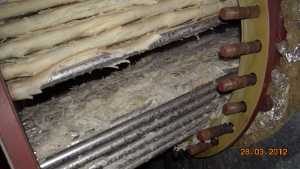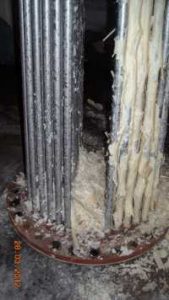A hot water boiler is used to heat and store drinking water. These boilers are often connected directly to the central heating system. Boilers and water heaters tend to have problems with limescale deposits, especially when temperatures are high.
Older boilers made of mild steel can begin to corrode after a few years. For this reason, boilers today are often made of stainless steel.
If merus rings are installed at the water feed line, existing lime deposits and rust are dissolved in the water and can no longer settle. These deposits are rinsed out together with the water.
There is one factor which can reduce the efficiency of the water treatment. This is the electrical field which is emitted by the heating spiral. If this field is too strong not the whole incrustation can be solved but nevertheless the new formation of deposits is reduced significantly.
Many customers report, after the installation of a Merus Ring, that the hot water heater no longer needs to be descaled. This is true both areas, in domestic environment and the industry. Here, too, boiler decalcification can be dispensed with. Or under very difficult conditions, the time between descaling is considerably longer than before.
Hot water boiler in a public swimming pool
The described application, are the hot water boilers in a public indoor swimming pool with a connected SPA area. The storage capacity of hot water in the boilers is relatively high to meet the requirements of peak consumption times. In total there are 4 boilers with a capacity of 3,000 litres each. More than 30 showers need to be supplied.
The temperature in the boiler has to be at least 60°C, to avoid a possible growth of legionella in the water system. During the daytime there are fewer customers using the pool and the showers.
Then there is only a low flow rate in the boilers. As a result the heat bundle has a high tendency of furring up.
The raw water is not treated chemically for cost reasons.
Due to the low flow rate in the boiler itself, more lime is formed on the heating coils. Compared to industrially used heat exchangers with a constant high flow rate.
The customer therefore had to decalcify his boilers regularly. They had to dismantle, remove the heat bundle, clean with chemicals and reassemble it. This involved a great deal of effort and corresponding costs.
Water treatment – hot water boiler
4 hot water boilers (each with a capacity of 3000L) are all in one room, very close to each other. That is why we have installed only one 3″ Merus Ring on the common supply line for all 4 hot water boilers.

We decided to check the performance during regular downtime, when the service is done anyway. When the heating bundles were dismantled, these photos were taken.
We can see, there is only a soft layer of limescale on the heating bundle and only in the upper part of the heat exchanger. The few chunks of limescale couldn’t block the pipes anymore. They occur while the heat exchanger is active and settle when it is disassembled. The deposits are so soft, they will just fall off the heating bundle when it is put on the floor.
This means that cleaning is far easier and cheaper. A water hose is sufficient, to flush away the scale.

When it will pay off?
Installing one 3“ Merus Ring is a small investment compared to the costs caused by long downtime due to cleaning. Therefore the investment pays off in short time.
As the heating bundles work more efficiently without incrustations energy for the heating is saved. These savings can only be estimated roughly as there is not enough data from the past. The customer and we assume that the savings are substantial as even one millimeter of limescale at the surface of the heating bundle reduces the heat transfer by 14%.
